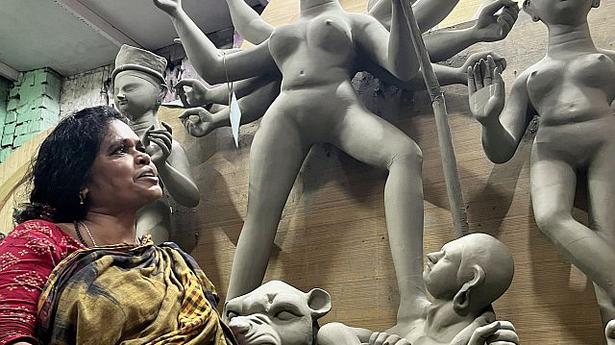
China Pal, the idol-maker who became an idol
The Hindu
China Pal, 45, is today a respected member of Kolkata’s idol-making fraternity that is based in the riverside settlement of Kumartuli.
That she went to China in 2018 to attend an art festival in Kunming has no connection with her name. She has always been known as China, derived from the Bengali expression chai na, or “don’t want”, having been born as the sixth child of her parents, who already had three daughters and didn’t want any more.
“I hope they named me in jest and not in irritation,” says China Pal, 45, who has carried forward her late father’s profession of idol-making and who looks after her mother, now in her mid-nineties. She is today a respected member of Kolkata’s idol-making fraternity that is based in the riverside settlement of Kumartuli and has won numerous honours and made appearances in several high-profile events in the recent years. Ahead of this year’s Durga Puja, she will appear in the commercial of a top jewellery brand; the shooting took place recently and she was required to paint the eyes of the goddess.
Also read: The godmakers of Kumartuli
China, in that sense, is a celebrity of sorts, but she insists that she does not allow this recognition to go to her head because she has seen it all. “I meet girls who say they want to be like me. I tell them that my life has been that of a struggle, I have fought my way to wherever I am today and I like to stay rooted,” says the artisan, sitting in a workshop packed with half-finished idols. Three of these will go outside Bengal — to Kashmir, to Odisha and to Madhya Pradesh. She also got an order from the US but she had to refuse because orders from within Kolkata are too overwhelming — after two years dampened by the COVID-19 pandemic — for her to work with fibreglass, which is usually the material used when idols are shipped abroad. The only downside this year, she says, is the inflation: the cost of raw material has doubled. “But I will manage,” she says.
It was around the same time — with some weeks to go for Durga Puja — in 1994, when her father, Iswar Hemanta Pal, passed away after a brief illness. China, around 16 at the time, took over the business. Her father didn’t approve of her working on idols, neither did the in-laws of her elder siblings, but she would sneak into the workshop when the father would be away for lunch or on days he stayed home. That’s how she learned her craft.
“When he died, there were two unfinished sets of Durga idols. The workers wouldn’t listen to me — they would keep disappearing for smoke breaks half the time. An uncle somehow helped me finish those two idols. That year, our total profit was ₹3,000 — that amount became my working capital as I started from scratch, getting rid of the workers over the next couple of years and getting new people,” recalls China.
“During the early years I would be bullied. I would overhear people saying: ‘How long is she going to last!’ But I’ve proven them all wrong. That’s because I worked very hard. The workers reported for work at eight in the morning but I would be here 10 minutes before them, having finished all the chores and cooking at home,” she says.











